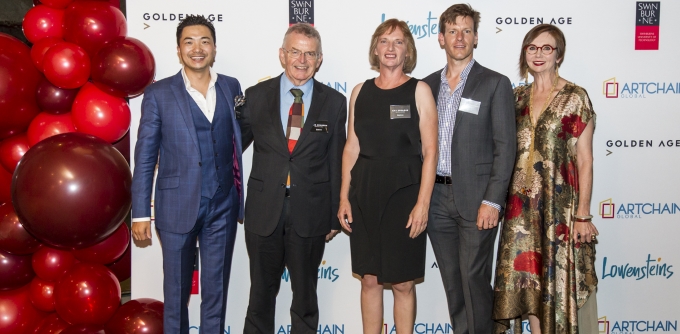
Byron Ding, Greg Adamson, Kay Sprague, Cameron MacQueen, Sharon Orbell. Source: Supplied.
A Melbourne-founded startup aiming to put high-value artworks on the blockchain has raised $4 million in seed funding in just 48 hours, and has set its sights on the Chinese art and crypto market.
ArtChain Global was established this year by founders Kay Sprague and Cameron MacQueen. The startup kicked off its official launch this month, ahead of a six-week long roadshow across China.
Sprague is the former managing director of Citigroup and a former vice president of JP Morgan’s asset management division. MacQueen has worked in management and marketing roles at a number of Australian companies, including a multinational property development business.
Together, the two have formed a team to create ArtChain, which MacQueen tells StartupSmart will be a platform to “clean up” parts of the art industry and pull its standards in line with other industries where high-value goods are bought and sold.
“Say you buy a house. There’s a registry system so now everyone knows it’s your house, when you bought it, and what the value was. But for the art and collectibles space, there’s nothing,” he says.
“It’s a complete black hole that leads to a lot of dodginess, and we’ve all heard about artwork being stolen or replicated.”
By using blockchain technology, MacQueen says the industry now has the opportunity to use a platform that ties a lot of desired elements together. He says it will function a bit like eBay, where the platform knows who and what is purchased but the details appear anonymous to users.
It will allow art owners to track and trace a single piece of art through its ownership history, and each piece being loaded into the system will be authenticated by “industry gurus” to help eradicate fakes.
The provenance-tracking aspect will be just one of the features, however, with the team also hoping to establish a marketplace for new and existing artists and art owners to trade their art either peer-to-peer, or via a gallery or auction house.
$4 million in 48 hours
The ArtChain Global team has also managed to secure a $4 million seed round, which was raised without using a crypto-fuelled initial coin offering. MacQueen says the team was fortunate to have numerous connections in the venture capital space, which helped them raise the funds so quickly.
“We turned around to quite a number of people in the investing and VC space with the suggestion of what we were doing, and these people also play in the art circles so they could instantly see the value in what we’re doing,” he says.
“That meant we raised our seed round in just a couple of days.”
ArtChain Global’s first launch market is Australia, and the team has even enlisted the help of technologists at the Swinburne University of Technology to help them build the blockchain platform. From there the next target is China. Eventually ArtChain wants to cover the Asian and Australian art markets, which MacQueen says is home to 40% of the art trade.
The company has also commenced a pre-ICO as part of a $20 million full ICO, which has so far raised approximately $1 million at current Ethereum prices. MacQueen says the company’s $20 million target will “more than suffice”; the startup doesn’t want to request too much more due to the heightened expectations that would be associated with exorbitant amounts.
“The focus for this ICO will likely be the crypto space rather than the art collector space, though if there’s art lovers already in the crypto space we’ll find them,” he says.
“Blockchain is a hard sell for the old-school art world and we’re not trying to cause friction.”
A solid business case needed for ICOs
Despite that hard sell, MacQueen views ArtChain as one of the better use cases for blockchain tech in recent times, saying a lot of the projects out there currently are “fantasy”.
“When you look at the space and you start digging into projects’ business models, honestly 90% of them are fantasy. This is real business and our team are real business people with success taking companies public,” he says.
With that in mind, for any founders considering an initial coin offering, MacQueen warns the attitudes towards blockchain companies have switched drastically in just 12 months.
“It’s not the space it was in 2017, where if you had just an idea people would throw money at you. Now, if there’s not a serious business case, it’s going to be too hard,” he says.
“So make sure your business case is solid.”


COMMENTS
SmartCompany is committed to hosting lively discussions. Help us keep the conversation useful, interesting and welcoming. We aim to publish comments quickly in the interest of promoting robust conversation, but we’re a small team and we deploy filters to protect against legal risk. Occasionally your comment may be held up while it is being reviewed, but we’re working as fast as we can to keep the conversation rolling.
The SmartCompany comment section is members-only content. Please subscribe to leave a comment.
The SmartCompany comment section is members-only content. Please login to leave a comment.